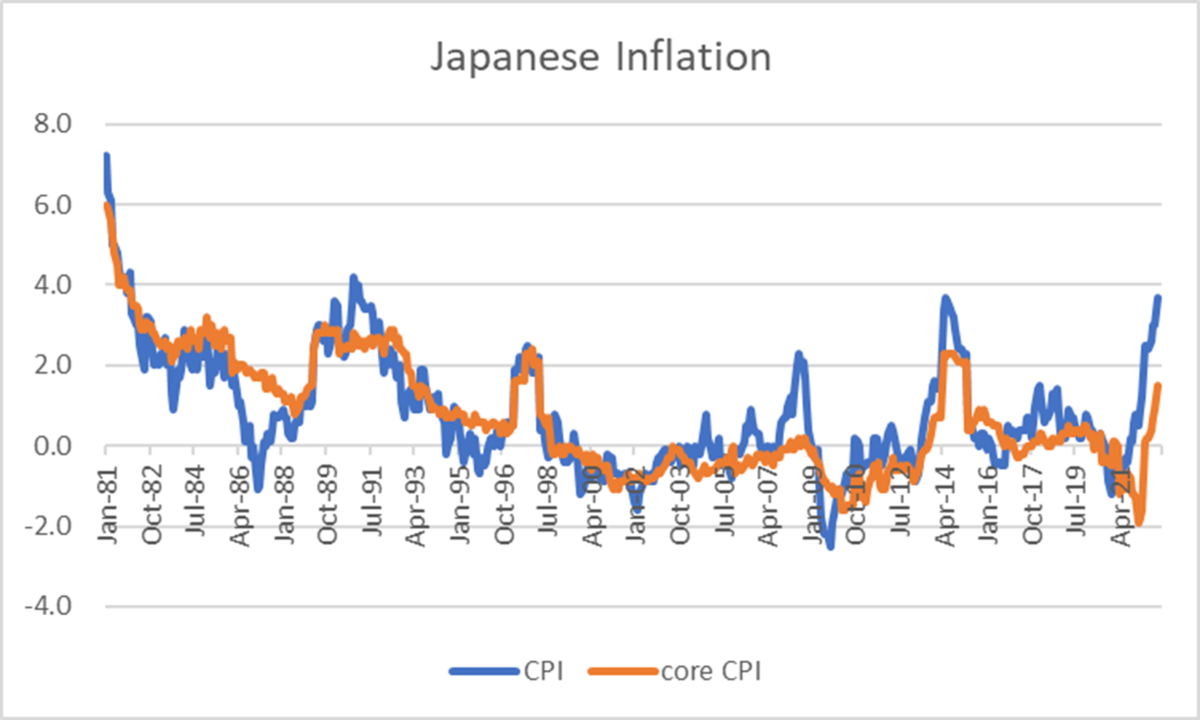
<Japanese>
日本の10月CPIは、総合で前年同月比+3.7%とほぼ41年ぶりの高水準に達しました。エネルギーと食品を除く欧米流のコアで見ても、前年同月比+1.5%まで上がってきました。日銀短観の中にある、5年後のCPI予想も、コロナ前(2020年3月)の+1.0%から直近(2022年9月)は年+2.0%まで切り上がってきています。日銀が望んでいるような、強い需要や賃上げを原因とする「よいインフレ」ではないかも知れませんが、2013年4月から8年半以上続けてきた異次元の金融緩和で実現しなかったインフレがようやく実現し、日本人の心に長年にわたって染みついていたデフレマインドを「ぶっ壊し」てくれたことを前向きに捉えるべきではないかと思います。
あくまで私見ですが、日本の生産性が低い一因は、高品質のモノやサービスに対して正当な対価が払われていない点にあると思っています(生産性はあくまで「カネ」を物差しとして計測されるため)。「おもてなし」や「(無料の)サービス」も悪くはありませんが、この機会に、高い付加価値に対しては正当な対価を払うことが当たり前の社会に変えていくべきではないかと思っています。その結果としてのインフレはきっと「よいインフレ」です。
日本で長年にわたって賃金が上がらなかった要因は以下3つと言われています。
①(生産性対比で割高になっていた)中高年正社員の賃金切り下げ
②(男性と比べて相対的に賃金が低い)女性の就業シェア増加
③(正規社員と比べて相対的に賃金が低い)非正規社員のシェア増加
人口減少はもはや日本だけの問題ではなく、世界の多くの国々が人手不足に陥っています。希少な人手には正当な対価を支払わざるを得ない状況になってきたということです。上記の①は正常化なので仕方ないと思いますが、②と③については正当な賃上げという形の正常化を進めつつ、今のインフレを「よりよいもの」に変えていく努力が今の日本に必要だと思っています。
<English>
Japan's October CPI reached +3.7% y/y, the highest level in almost 41 years. The core CPI, which excludes food and energy, rose to +1.5% y/y. The CPI forecast in 5 years by Japanese companies traced in the BOJ's Tankan Survey has also risen up from +1.0% in the pre-Corona period (March 2020) to +2.0% per year in the latest period (September 2022). It may not be the "good inflation" caused by strong demand and wage increases that the BOJ is hoping for, but the inflation that has not been realized through more than eight and a half years of unprecedented, unconventional monetary easing since April 2013 has finally been realized, "busting" the deflationary mindset that has been ingrained in Japanese minds for years. I think we should look at this as a positive development.
In my opinion, one of the reasons for Japan's low productivity is that high quality goods and services are not paid for fairly (productivity is measured in terms of "money"). Omotenashi (hospitality) and (free) services are not bad, but I believe that we should take this opportunity to change our society to one where it is natural to pay fair prices for high added value. The resulting inflation is surely "good inflation.
It is said that there are three reasons why wages have not risen in Japan over the years
(1) The devaluation of wages for middle-aged and older full-time employees (who were relatively overpaid in relation to their productivity)
(2) An increase in the share of women in the workforce (whose wages are relatively low compared to men)
(3) Increase in the share of non-regular employees (whose wages are relatively low compared to regular employees)
Population decline is no longer a problem unique to Japan; many countries around the world are facing labor shortages. It means that we are now forced to pay a fair price for scarce manpower. I believe that (1) above is normalization and cannot be helped, but for (2) and (3), I believe that Japan now needs to make efforts to promote normalization in the form of legitimate wage hikes and change the current inflation to a “better" one.
<German>
Der japanische CPI erreichte im Oktober mit +3,7% y/y den höchsten Stand seit fast 41 Jahren. Der Core-CPI, ohne Nahrungsmittel und Energie, stieg auf +1,5 % im Jahresvergleich. Die in den Tankan-Berichten der BOJ ermittelte CPI-Prognose der japanischen Unternehmen in 5 Jahren ist ebenfalls gestiegen, und zwar von +1,0 % in der Zeit vor der Corona (März 2020) auf +2,0 % pro Jahr im jüngsten Zeitraum (September 2022). Es mag nicht die "gute Inflation" sein, die durch die starke Nachfrage und die Lohnerhöhungen verursacht wird, die sich die BOJ erhofft, aber die Inflation, die in mehr als achteinhalb Jahren beispielloser, unkonventioneller geldpolitischer Lockerung seit April 2013 nicht zustande gekommen ist, wurde endlich realisiert, wodurch die deflationäre Denkweise, die sich seit Jahren in den Köpfen der Japaner festgesetzt hat, "zerschlagen" wurde. Ich denke, wir sollten dies als eine positive Entwicklung betrachten.
Meiner Meinung nach ist einer der Gründe für Japans niedrige Produktivität, dass hochwertige Waren und Dienstleistungen nicht fair bezahlt werden (Produktivität wird in "Geld" gemessen). Omotenashi (Gastfreundschaft) und (kostenlose) Dienstleistungen sind nicht schlecht, aber ich glaube, dass wir diese Gelegenheit nutzen sollten, um unsere Gesellschaft so zu verändern, dass es selbstverständlich ist, für einen hohen Mehrwert faire Preise zu zahlen. Die daraus resultierende Inflation ist sicherlich eine "gute Inflation".
Man sagt, dass es drei Gründe gibt, warum die Löhne in Japan lange nicht gestiegen sind
(1) Die Abwertung der Löhne für Vollzeitbeschäftigte mittleren Alters und älter (die im Verhältnis zu ihrer Produktivität relativ überbezahlt waren)
(2) Zunahme des Anteils der Frauen an Erwerbstätigen (deren Löhne im Vergleich zu denen der Männer relativ niedrig sind)
(3) Anstieg des Anteils der nicht regulär Beschäftigten (deren Löhne im Vergleich zu regulär Beschäftigten relativ niedrig sind)
Der Bevölkerungsrückgang ist nicht mehr nur ein Problem Japans, sondern in vielen Ländern der Welt herrscht Arbeitskräftemangel. Das bedeutet, dass wir jetzt gezwungen sind, einen angemessenen Preis für knappe Arbeitskräfte zu zahlen. Ich glaube, dass (1) oben eine Normalisierung ist und nicht geholfen werden soll, aber für (2) und (3) muss Japan jetzt Anstrengungen unternehmen, um die Normalisierung in Form von legitimen Lohnerhöhungen zu fördern und die derzeitige Inflation in eine "bessere" zu ändern.